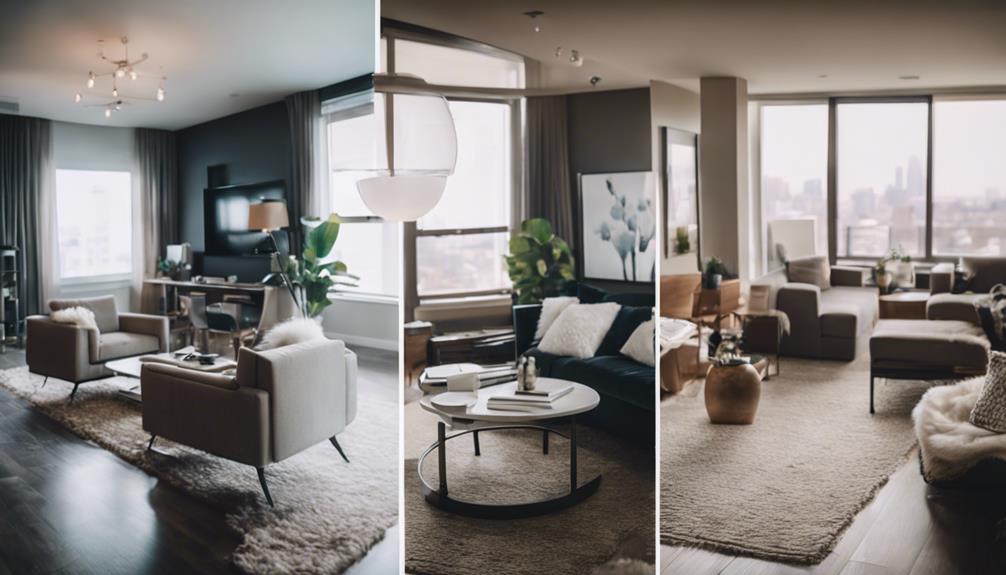When deciding to buy or rent a condo, consider your financial situation and lifestyle. Check the price-to-rent ratio: ratios between 1-15 generally favor buying, while 21 or higher suggests renting. Renting gives you flexibility, ideal for those uncertain about long-term commitment. However, owning offers stability and potential equity growth. You'll also face responsibilities like maintenance and HOA fees, which can vary widely. Assess your future plans and investment goals carefully. Understanding these factors can guide you toward the choice that aligns with your needs. There's a lot more to unpack to make this decision easier for you.
Key Takeaways
- Calculate the price-to-rent ratio to determine if buying or renting is financially favorable for your situation.
- Consider lifestyle flexibility; renting allows easy relocation, while buying offers stability and ownership.
- Be aware of ongoing responsibilities as a homeowner, including repairs and HOA fees, which impact budgeting.
- Evaluate investment potential; condos can appreciate in value, providing financial benefits over time compared to rental payments.
Price-to-Rent Ratio Analysis
To make an informed decision about whether to buy or rent a condo, you should first calculate the price-to-rent ratio, which can reveal the financial advantages of each option.
Start by dividing the average home sale price by the average annual rental price. For example, if a condo costs $225,000 and rents for $16,800 annually, your ratio is 13.
A ratio of 1-15 indicates it's generally better to buy, while 16-20 suggests some risks in buying. If your ratio is 21 or higher, renting may be the smarter choice.
This analysis helps you understand the potential costs and benefits associated with each option, guiding you toward the right decision for your financial situation.
Lifestyle Considerations
Lifestyle plays a crucial role in deciding whether to rent or buy a condo, as each option caters to different preferences and circumstances. For those who prioritize flexibility and the ability to relocate easily, renting a condo might be the better choice, while buying often appeals to individuals seeking long-term stability and an investment opportunity. Ownership also allows more freedom to personalize the space, such as the ability to transform your home with color through bold paint choices or creative decor. Ultimately, the decision should align with your financial goals, lifestyle needs, and future plans.
If you value flexibility and aren't ready to commit long-term, renting might be the better choice. It allows you to change locations easily and adapt to new job opportunities or personal situations.
On the other hand, if you're looking for stability and a place to call your own, buying may suit you better. Homeownership lets you customize your space and build equity over time.
Consider your current lifestyle, future plans, and financial situation. Ultimately, your decision should align with what you envision for your life in the coming years.
Responsibilities of Ownership

Owning a condo comes with specific responsibilities that you'll need to manage, from maintaining the interior to paying property taxes and insurance.
You're responsible for repairs, whether it's fixing a leaky faucet or replacing appliances.
Additionally, you'll need to budget for homeowners association (HOA) fees, which cover community upkeep and amenities. These fees can fluctuate, so keep that in mind.
If you decide to relocate, selling the property falls on you. Your commitment to ownership means you'll have ongoing obligations, which can be a significant change from renting.
Make sure you're prepared for these responsibilities, as they play a crucial role in your overall condo experience and financial planning.
Investment Potential
Investing in a condo can yield significant returns, especially in urban areas where demand often drives property values upward.
If you're considering this investment, think about the potential for appreciation over time. As property values rise, your equity increases, providing financial leverage for future investments or retirement.
Additionally, condo ownership allows you to benefit from fixed monthly payments, unlike renting, where costs can escalate after lease renewals. You're also contributing to an asset rather than a temporary arrangement.
Keep in mind that the location and amenities can significantly impact resale value. By carefully selecting a condo in a desirable area, you enhance your investment's potential, making it a strategic move for your financial future.
HOA Fees and Regulations

When considering a condo, it's crucial to understand the implications of HOA fees and the regulations that come with community living. These fees often cover maintenance, amenities, and security, but they can vary significantly. You'll want to be aware of the rules, as they could dictate your lifestyle choices.
You might face restrictions on pet ownership.
Over time, fees could increase unexpectedly.
Noncompliance can lead to fines or penalties.
Rules may limit your ability to rent out your unit.
Understanding these regulations can save you from frustration.
Before committing, make sure you're comfortable with both the financial and lifestyle obligations that come with your new home.
Conclusion
Ultimately, deciding whether to buy or rent a condo hinges on your unique situation.
If you crave stability and the pride of ownership, buying could be your canvas to paint a long-term future.
On the flip side, if you value flexibility and minimal responsibilities, renting might be your easy escape.
Weigh the price-to-rent ratio against your lifestyle and future goals; the choice is yours to shape, creating a living situation that best reflects who you are.









